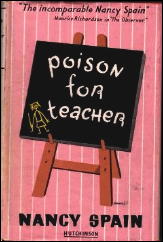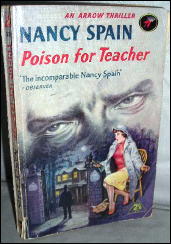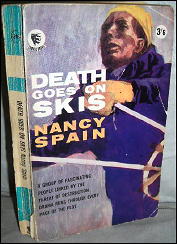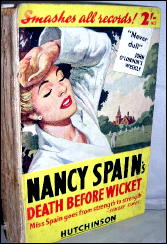Wed 2 Feb 2011
Journalist, television and radio personality and “iconic lesbian” Nancy Spain (1917-1964) was a well-known individual in fifties and early sixties Britain. (On the other hand, she was little known in the United States and remains so today.)

Although she had many accomplishments, one of her most significant undertakings was a series of ten mystery novels published between 1945 and 1955, a period when the classical British detective story was being increasingly marginalized by the crime novel, which placed less emphasis (sometimes no emphasis) on fair play puzzle construction.
While Nancy Spain’s mysteries maintain a formal commitment to the puzzle structure, nevertheless she is typical of the time in which she wrote in placing greater emphasis on other elements, namely humor and character. Especially notable in her books is her sly subversion of sexual mores of the post-WW2 era.
As her 1997 biographer, Rose Collis, notes, Spain was a “trouser-wearing character” — a sort of “not in though not exactly explicitly out” homosexual (rather like America’s Liberace) who humorously winked at her straight audience (not all of whom got the joke) and inspired her gay one. One sees this quality as well in her mysteries.
Nancy Spain’s best-known mystery is Poison for Teacher (Hutchinson, 1949), which was reprinted by Virago Press’ Lesbian Landmarks series in 1994. At the amusingly named girls school Radcliff Hall (obviously a play on the name of author Radclyffe Hall, author of the milestone 1928 lesbian novel, The Well of Loneliness), murder strikes a blackmailing, scheming teacher during the performance of a school play. Another murder of a teacher, this time a shooting, follows.

On hand, rather improbably, are Spain’s amateur (very amateur) detectives. The first of these is Natasha DuViven, former Russian ballet star and estranged wife of Johnny DuVivien, an Australian former wrestler and current English nightclub owner who was Spain’s amateur detective in her first four detective novels (Poison in Play, Death Before Wicket, Murder Bless It! and Death Goes on Skis).
The second is Miriam Birdseye, an actress Spain based on the real-life English actress Hermione Gingold (who, incidentally, was married at one time to Eric Maschwitz, who under the name Holt Marvell co-wrote crime novels with Val Gielgud, Sir John Gielgud’s brother).
Natasha is, like her soon-to-be ex-husband Johnny, a well-conveyed character — Spain has a good ear for native dialect — and, though indolent by nature, she does most of what actual detecting is done in the novel. Miriam, though by this novel (she debuted in Death Goes on Skis) has surprisingly set up a detective agency (so I suppose is actually technically a professional), is in the tale solely for humor, such as we see in this exchange:

“Yes,” said Miss Lipscoomb, and sank into a chair. She put her head in her hands. “I think it is true,” she said. “But how did you know?”
“That’s an old one,” said Miriam briskly. “I always used to tell my first husband he was going mad,” she said. “In the end he did,” she added triumphantly.
There’s also a local policeman, one Sergent Tomkins, who is an enjoyable character (in grand tradition he immediately, though unbelievingly, works in tandem with Natasha and Miriam). Also assorted “queer” lady teachers (some lesbian, some not), some objectionable students, a recurring gay male character, Roger Partick-Thistle (we learn here that he is hiding a scandal from his past that took place when he was a scout leader, something played for laughs) a male detective novelist (much inferior to the Crime Queens, we learn) and a Jewish doctor (Spain emphasizes his Jewishness, just as she emphasizes the “queerness” of the obviously gay characters).

There’s humorous satire directed against girls’ schools (Spain herself went to Rodean) and sexual foibles, as well some interesting asides on detective fiction. The mystery is rather a mess, however. While there is fitful investigation, intricate clueing is absent; and the solution is handed to the investigators.
You may be left with questions at the end, assuming you care about the mystery. Most of Spain’s readers probably did not.
Though Poison for Teacher is Spain’s best-known detective novel, I actually preferred the earlier Death Before Wicket (Hutchinson, 1946). Johnny DuVivien, Spains’ first series detective, is a good character and an energetic investigator; and though the mystery plot in no classic, it is better managed than the one in Teacher and its resolution is more plausible.
The setting is again at a girls school, this one in Yorkshire (Johnny’s daughter from his first marriage, Pamela, is a student there); and in addition to the school satire there is convincing and amusing portraiture of the local gentry (Spain herself came from northern England, of “good stock”).

The murder victim in this tale is a fetching games mistress who slept with an impressive number of men, including an odd ex-army gent with a really quite pronounced fetish for masculine women. More alternative sexuality turns up in a brief visit to a club with a gay clientele, of your standard “mystery queen” variety (here portrayed more harshly than in the case of Roger Partick-Thistle).
On the evidence of these two books, it seems clear to me that Nancy Spain had a gift for humor and character portrayal that makes her mystery novels worth reading even today, over half-a-century after the last of them was originally published. Just don’t expect Crime Queen level plotting, and you should not be disappointed.
Today Nancy Spain is best known in the mystery world for having had, despite her lesbianism, a brief fling with Margery Allingham’s husband (an affair that produced a child). But her enjoyable mysteries should be get some attention as well.
Editorial Comments: Another review of Poison for the Teacher by Emily Dewsnap can be found online here. A short biography of Nancy Spain may be found at the Golden Age of Detection wiki. None of her mystery novels have been published in the US.
February 2nd, 2011 at 7:29 pm
I didn’t know much more about Spain than the name and the reputation, but now I may look up one or two of these. They sound like fun, and there is always room for another amusing mystery writer on my shelves.
February 2nd, 2011 at 8:05 pm
I’ve read one book by Spain, or maybe even two, but it was a long time ago, and I can’t even remember the titles. All I recall is thinking them “strange,” but now I know why.
I still have the books. I’ll have to read one of them again.
February 2nd, 2011 at 9:46 pm
Thanks for the link to the other review. Poison for Teacher, naturally! This has become her best known book since the 1994 reprint. I don’t believe it’s her best one though. For me it needed a stronger plot to make it linger in the mind, though it is amusing.
February 3rd, 2011 at 5:01 pm
A year or so ago every single one of Spain’s books came up for sale on eBay over a month long period. I passed on all of them. Nuts! She is definitely someone I am interested in reading now. Thanks for this fine tribute, Curt.